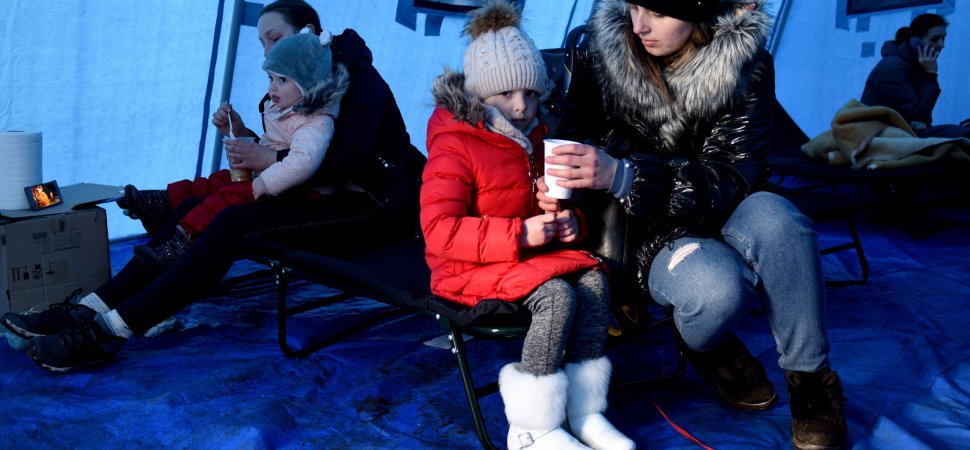
At age 11, Semyon Dukach and his family fled the Soviet Union in 1979 with just $100 among them. He would become a professional blackjack player, a founder of technology companies Vert and Fast Engines, and an angel investor to more than 100 companies. In 2017, he founded his venture capital firm, One Way Ventures, which invests in immigrant-founded businesses. Last week, Russia’s invasion of Ukraine prompted Dukach and his wife, Natasha–a healthcare data analyst who emmigrated from Ukraine on a cultural exchange visa as a musician a little over a decade ago–to quickly get deeply involved. They rushed to the Ukraine-Romania border and quickly figured out refugees’ biggest need: cash, which they provided, no questions asked. The pair have since launched a website, CashForRefugees.org, and are looking to ramp up their efforts. –As told to Rebecca Deczynski
My wife, Natasha, and I were very upset about the events that were unfolding in Ukraine. She’s Ukrainian, and we both have a lot of friends who live there. Last Thursday, the day that Russia invaded, she started booking Airbnbs WHERE for people who were crossing the borders by foot, but by Friday, it started to feel overwhelming–there were so many logistical questions and it wasn’t clear that this was what people actually needed.
So, she looked at me and said, “I’m going over there.” I said, “Okay, I’m going with you.” We got our 17-year-old to step up to watch our younger child, and we got on a plane Friday night with about $5,000 in cash.
We landed in Romania on Saturday and drove for about six hours in a rental car to get to a border crossing in a town called Siret. It was incredibly emotional and heart-wrenching. We saw so many women who had spent hours traveling, sometimes walking in the snow, having just said goodbye to their husbands, maybe to never see them again. They were in a daze and didn’t know what they needed–so we had to figure out how to help.
By Sunday morning, we realized that arranging housing for refugees wasn’t much of a help–there were already bigger organizations effectively doing that and busing people to hotels. There were also plenty of people giving away food, blankets, and diapers. It dawned on us that what these women actually needed was a little bit of money in local currency, just to maintain a feeling of freedom.
It wasn’t that all the refugees were poor–many of them just weren’t able to grab cash before they had to leave, so many were in a position of needing food and shelter and not having any money on them. So, we started giving them cash–we landed on about $100 in Romanian currency as the ideal amount, and got some more money from all the ATMs we could find.
It took us a while to figure out the best way to approach people–at first many were reluctant, but once they realized what we were offering, it became very emotional. We ended up distributing about $7,000 to 100 women, most of them with children. On the plane back, I built a website and started thinking about how we could scale this. We raised about $50,000 in 24 hours, and my wife is returning this weekend with about six other people to try to distribute about $100,000 at a few different boarder crossings.
We don’t think this will become a huge non-profit, but it can certainly be more than two people, and it has the potential to help other refugees beyond this crisis. Ideally, we want to have people working in pairs–one person giving out the cash and another person taking photos as a verification that the money’s going to the right place. We’ve had to move very quickly, so we don’t yet have the structure to raise tax deductible donations–we’re working on partnering with an established charity for that.
I’m sure other people have given out cash to refugees before, but it’s challenging to work with physical bills–there’s a lot of overhead that has to go on to make sure it’s secure. Eventually, it might be better to figure out a way to send money directly to recipients for several months to help them get on their feet. But for now, a little bit of cash right at the border crossing itself feels like a good place to start.
I’m very passionate about immigrants–I myself was a refugee who came to the U.S. from Moscow in 1979, and my VC firm invests in immigrants from all over the world who come to the U.S. to build big, disruptive businesses. We believe that people should be able to go anywhere in the world, regardless of their papers, to start a company. The world should be more open for opportunity.
We see immigrants as a pre-vetted group–they’ve been through a lot of difficult experiences already, so when they build a business, they’re not likely to give up along the way. While there’s no direct connection between the VC firm and this effort, we are all immigrants, and we really believe in this stuff.
